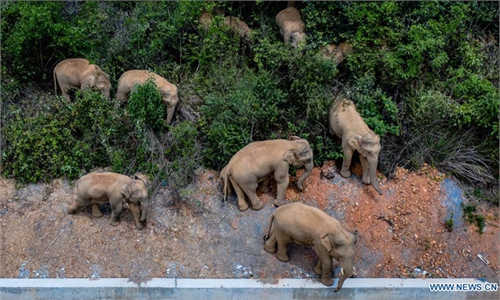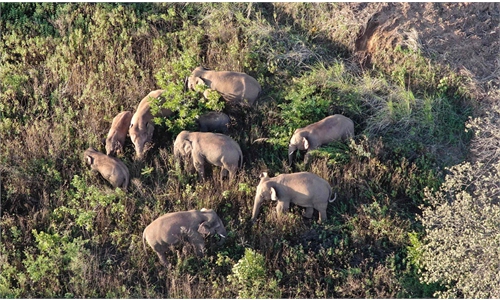
Deputy director of the National Forestry and Grassland Administration Li Chunliang presents a photo of the four Asian elephants on Monday. Photo: China.com.cn
The 15 wild Asian elephants that went on a 1,400-kilometer "exodus" in 2021 in Southwest China's Yunnan Province are now back in their original habitat in Xishuangbanna and the two calves born during their trek have grown to 300 kilograms, the National Forestry and Grassland Administration revealed on Monday.
The herd of Asian elephants came into the global spotlight in 2021 after their unusual northward journey since March 2021.
The elephants returned to their original habitat in Xishuangbanna after the 124-day trek which covered a distance of over 1,400 kilometers, said Li Chunliang, deputy director of the National Forestry and Grassland Administration, during a press conference on Monday.
At the Monday conference, Li presented a photo taken of four elephants including two calves which drew much public attention back in 2021 because they were born during the trek. The photo was taken by frontline monitoring staff.
According to Li, the calves are living a very healthy life and have grown to an estimated 300 kilograms now. They weighed 100 kilograms when they were born.
Li said that China has established a new nature reserve system composed of national parks, nature reserves and various types of natural parks.
A first batch of five national parks - the Sanjiangyuan National Park, the Wuyi Mountain National Park, the Giant Panda National Park, the Northeast China Tiger and Leopard National Park and the Hainan Tropical Rainforest National Park - have been officially established. Two national botanic gardens in Beijing and Guangzhou have also been set up.
Over the past decade, China has stepped up efforts in promoting the harmonious coexistence of humans and nature, and remarkable results in preserving natural resources have been achieved, with 74 percent of wildlife species under special protection and 65 percent of higher plant communities being effectively preserved.
Global Times


